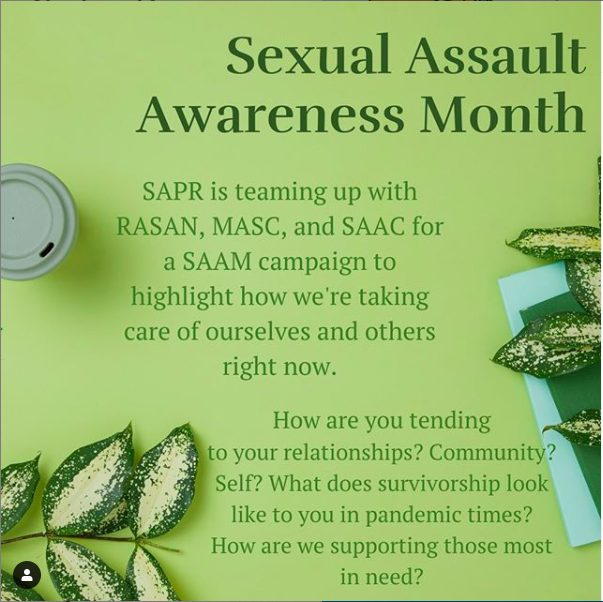
On April 13, the College’s Office of Sexual Assault Prevention & Response (SAPR) launched a digital campaign to observe Sexual Assault Awareness Month (SAAM) on social media. In conjunction with multiple student organizations, SAPR sought to provide resources remotely to the student body and to support survivors by creating communities virtually.
The campaign consisted of collecting and presenting information on how to form healthy relationships, making social media posts based on student responses and providing students with available resources in order to raise community awareness about intimate violence prevention and protection.
“The goal of the campaign is to think about how we typically engage students and raise awareness in April and apply that thinking to the realities of our current moment,” acting director of SAPR Hannah Lipstein wrote in an email to the Record. “We’re focusing on themes of survivorship, community, and care (for self and others) in times of COVID-19.”
Mounting data, as reported by The New York Times, suggest that sexual assault has been on the rise worldwide ever since COVID-19 necessitated large-scale lockdowns.
Student organizations involved in the campaign include the Rape and Sexual Assault Network (RASAN); Masculinity, Accountability, Sexual Assault, and Consent (MASC); and the Student Athlete Advisory Committee (SAAC).
In past years, students and the administration have worked together to host events during the month of April that focused on sexual assault awareness. “[Events] included raising awareness at Stressbusters, hosting a volleyball tournament with SAAC and MASC to raise money for the Elizabeth Freeman Center, and leading Take Back the Night.” RASAN Treasurer Gwyneth Maloy ’21 explained.
Take Back the Night is a march across campus, followed by a gathering with speakers and an open mic, in celebration of “international solidarity and support for survivors of sexual assault and their supporters/allies,” according to Maloy. Because this year’s event was cancelled, the social media campaign was held in its place.
The campaign, which seeks to spread supportive thoughts, voices, messages and artwork, is currently accepting submissions through both social media and email. SAPR plans to select and post anonymous submissions on Instagram and Facebook. The office has mostly advertised through social media, Daily Messages and email lists from their partner organizations on campus.
“Student participation has been great!” Lipstein wrote. “We’ve been receiving way more responses than we’ve had time to make and post graphics for. It’s great to see how students are thinking about our SAAM themes these days, especially when we’re not able to run our typical prevention programming in person.”
In addition to raising social attention to the issue of sexual assault prevention, the campaign is also part of a larger process of campus-based prevention organizations making their resources and contacts available remotely.
RASAN, for example, has been seeking to transition its system from a telephone hotline to an online, appointment-based system.
“[We] have compiled a list of remotely accessible resources for students, both on and off campus,” Maloy said. “Given that everyone’s situation has changed drastically over the past few weeks, members may not be able to respond to emails immediately, but can direct student questions to another RASAN member if necessary.”
MASC, another student group involved in the campaign, is also seeking to continue its effort in making the campus safe for all. Prior to campus closure, the organization provided on-campus resources such as weekly discussion meetings, workshops designed for men’s spaces and bystander training for other students.
Following the transition to remote education, MASC sought to adapt their service. The board decided to reschedule in-person masculinity workshops and to alter their weekly discussion meetings into an opt-in biweekly newsletter. “The board will curate various articles and sources meant to give space for thought, particularly around masculinity.” MASC Publicity Chair Harrison Toll ’22 said.
Meanwhile, SAPR has maintained its SASS Survivor Services hotline, which is a 24/7 confidential hotline for Williams students, answered by specially trained Williams staff members. It is also working to expand its remote accessibility.
“We know that the work of ending intimate violence and supporting survivors doesn’t stop in times of crisis,” Lipstein said. “Beyond that, there are lessons that exist in sexual violence prevention that are also relevant to a pandemic, from understanding the resilience involved in responding to trauma, to thinking about ourselves as accountable to a larger sense of our community.”








